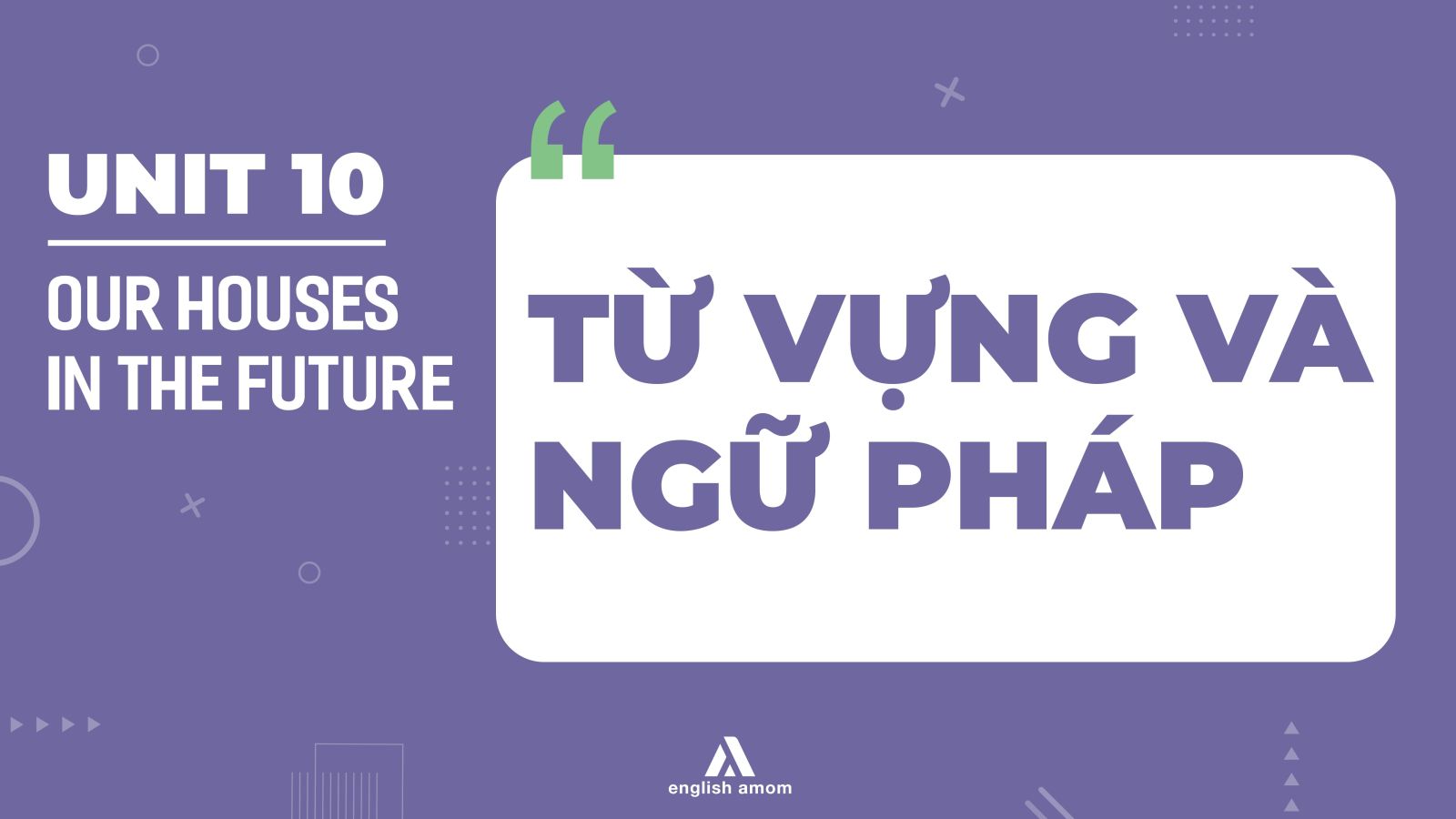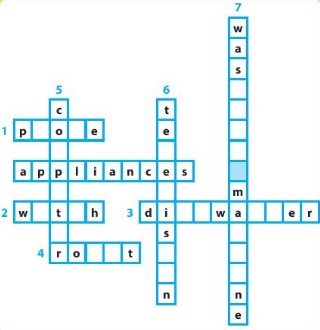
► Kênh hỏi đáp và giải thích thắc mắc kiến thức MIỄN PHÍ → truy cập LINK NHÓM: ENGLISH AMOM
► Kênh YOUTUBE hệ thống toàn bộ bài giảng CLIPS: truy cập LINK: ENGLISH AMOM CHANNEL
► Kênh TIKTOK: ENGLISH AMOM
1) Circle one odd word A, B, C, or D. Then read them aloud.
| 1. A. apartment | B. house | C. cottage | D. factory |
| 2. A. and | B. in | C. on | D. at |
| 3. A. kitchen | B. window | C. bedroom | D. living room |
| 4. A. computer | B. dishwater | C. housework | D. washing machine |
| 5. A. city | B. building | C. village | D. countryside |
ĐÁP ÁN:
1. D
2. A
3. B
4. C
5. B
2) Complete the sentences using the words in 1. The first letter of the word is provided for you.
1. We live in an a ..................... in the centre of Ha Noi.
2. There is a beautiful picture o....................the wall of my room.
3. They cook and eat meals in their small k..................... .
4. I have a c..................... to surf the internet.
5. My uncle lives in a cottage in the v.....................
ĐÁP ÁN:
1. We live in an apartment in the centre of Ha Noi.
2. There is a beautiful picture on the wall of my room.
3. They cook and eat meals in their small kitchen.
4. I have a computer to surf the internet.
5. My uncle lives in a cottage in the village.
3) Complete the crossword puzzle.
Across
1. In the future, they will have a ..................... to learn English
2. They will have a ..................... to surf the internet.
3. She will have a ..................... that cleans dishes without water.
4. They will have a ..................... to look after the children.
Down
5. Next century, we will have a ..................... to buy food from the supermarket.
6. They will have a ..................... to watch programmes from other planets.
7. They will have a ..................... to wash and iron our clothes.
ĐÁP ÁN:
Across
1. In the future, they will have a phone to learn English.
2. They will have a watch to surf the internet.
3. She will have a dishwasher that cleans dishes without water.
4. They will have a robot to look after the children.
Down
5. Next century, we will have a computer to buy food from the supermarket.
6. They will have a television to watch programmes from other planets.
7. They will have a washing machine to wash and iron our clothes.
4) Match the questions with the answers.
| 1. Will they live longer in the future? | a. Next decade. |
| 2. When will they have computers in their school? | b. By spaceship |
| 3. How will they travel to the Moon? | c. Yes, they will. |
| 4. What will help them to do the housework? | d. Under the ocean. |
| 5. Where will they live? | e. The robots will. |
ĐÁP ÁN:
1 - c: Will they live longer in the future? - Yes, they will.
2 - a: When will they have computers in their school? - Next decade.
3 - b: How will they travel to the Moon? - By spaceship.
4 - e: What will help them to do the housework? - The robots will.
5 - d: Where will they live? - Under the ocean.
5) Complete the dialogues with will or won’t.
1. - A: What would you like to drink?
- B: I ............. have a lemonade, please.
2. - A: I’m afraid Linda can’t see you until 4 o’clock.
- B: Oh, in that case I ............. wait.
3. - A: I’m very worried about my examination next week.
- B: Don’t worry. You ............. pass.
4. - A: Look at that dog. It’s dangerous.
- B: Don’t worry. It ............. hurt you.
5. - A: It’s cold in this room.
- B: Is it? I ............. turn on the heater.
ĐÁP ÁN:
1. A: What would you like to drink?
B: I will have a lemonade, please.
2. A: I’m afraid Linda can’t see you until 4 o’clock.
B: Oh, in that case I won’t wait.
3. A: I’m very worried about my examination next week.
B: Don’t worry. You will pass.
4. A: Look at that dog. It’s dangerous.
B: Don’t worry. It won’t hurt you.
5. A: It’s cold in this room.
B: Is it? I will turn on the heater.
6) Complete the dialogues using will ('ll) and the suggested cues in brackets.
1. - A: I’ve got a terrible headache.
- B: ............................................. (get some medicines)
2. - A: Wait! Don’t go!
- B: .............................................. (stay)
3. - A: I need a new camera.
- B: .............................................. (buy)
4. - A: I don’t know how to use this computer.
- B: .............................................. (show)
5. - A: Please remember to turn off the lights before you leave.
- B: .............................................. (not forget)
ĐÁP ÁN:
1. A: I’ve got a terrible headache.
B: I’ll get you some medicines.
2. A: Wait! Don’t go!
B: I’ll stay.
3. A: I need a new camera.
B: I’ll buy you one.
4. A: I don’t know how to use this computer.
B: I’ll show you.
5. A: Please remember to turn off the lights before you leave.
B: I won’t forget.
7) Choose the correct option in brackets to complete each sentence.
1. Linh (might/ must) be there on time, I guess.
2. I (might not/ cannot) attend our English contest next Saturday, but I’ll try my best.
3. He practises running every morning. I think he (has to/ might) become a professional runner one day.
4. Her family (should/ might) move to the city, but I’m still not sure.
5. We (might/ must) find aliens on Earth one day, but I’m sure they will not speak our language.
ĐÁP ÁN:
1. Linh might be there on time, I guess.
2. I might not attend our English contest next Saturday, but I’ll try my best.
3. He practises running every morning. I think he might become a professional runner one day.
4. Her family might move to the city, but I’m still not sure.
5. We might find aliens on Earth one day, but I’m sure they will not speak our language.


